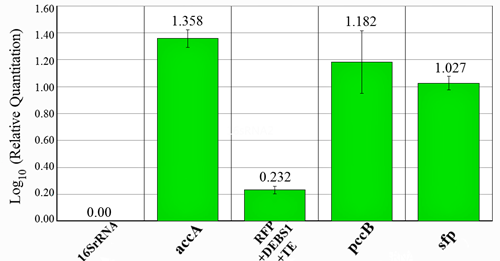Part:BBa_K1371041
RFP-DEBS1
DEBS1 was fused with red fluorescent protein
Sequence and Features
- 10COMPATIBLE WITH RFC[10]
- 12COMPATIBLE WITH RFC[12]
- 21INCOMPATIBLE WITH RFC[21]Illegal BamHI site found at 2590
Illegal BamHI site found at 7135
Illegal BamHI site found at 9984 - 23COMPATIBLE WITH RFC[23]
- 25INCOMPATIBLE WITH RFC[25]Illegal NgoMIV site found at 1270
Illegal NgoMIV site found at 2753
Illegal NgoMIV site found at 3125
Illegal NgoMIV site found at 3158
Illegal NgoMIV site found at 3631
Illegal NgoMIV site found at 4340
Illegal NgoMIV site found at 5213
Illegal AgeI site found at 604
Illegal AgeI site found at 716
Illegal AgeI site found at 1081
Illegal AgeI site found at 2443
Illegal AgeI site found at 2789
Illegal AgeI site found at 3368
Illegal AgeI site found at 5089 - 1000INCOMPATIBLE WITH RFC[1000]Illegal BsaI.rc site found at 2195
Illegal BsaI.rc site found at 4625
Illegal SapI.rc site found at 3460
Fluorescence detection analyses
To further confirm the expression of DEBS1, we monitored the fluorescence of RFP under Zeiss LSM710 confocal microscope (Fig.1). The results showed that after excitation with lazer source, red fluorescence was monitored in the RFP+DEBS1+TE transformant, while in the BL21 strain, no fluorescence was detected. These results indicate that RFP+DEBS1+TE was successfully expressed in the transformant.
Figure: Results of fluorescence detection
RT-PCR validation on transcriptional level
We used RT-PCR to examine the expression of the target genes on transcriptional level. We used 16S rRNA gene as an house keeping gene to compare the expression level of target genes. The results showed that DEBS1 gene was successfully expressed, albeit the transcription level was relatively low compared with other target genes (acc, pcc and sfp) whose transcription are controlled by T7 promoter as well.
UPLC-MS/MS Detection of TKL 1B
To test if RFP+DEBS1+TE was functionally expressed, the transformant was grown in Luria Broth (LB) liquid medium and induced with IPTG. After 48h of induction, cells were harvested and the supernatant was used for the extraction of the product TKL1B. After extraction, the samples were concentrated by 5 times and subjected into a triple quadrupole mass spectrometry and monitored under an MRM mode using the parent ion /product ion=173.1/155.1 channel. The retention time of the target product in the UPLC column was 6.42 min, using water/methanol gradient elution protocol. We monitored a strong response at m/z = 155.1 ion pair in the RFP+DEBS1+TE transformant sample. The ion pair of 173.1/155.1 is specific to the expected product TKL1B, and is in consistent with previous studies. These results demonstrated that TKL1B was successfully produced from the transformant.[4]
| n/a | RFP-DEBS1 |





